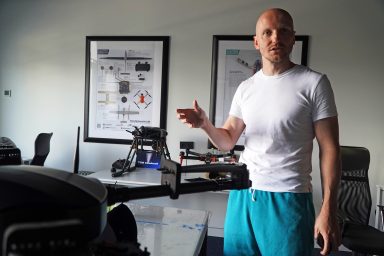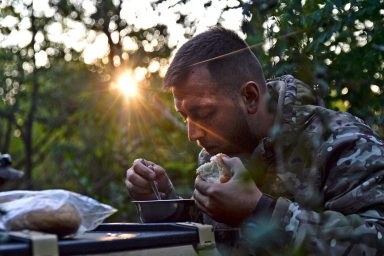A writer talks to Ukrainians in the moments before and after the Russian invasion begins, and reckons with her own childhood memories of a Soviet Ukraine.
On the morning of February 24, in a Ukrainian suburb 50 miles south of Kyiv, an in-demand nail artist named Katya awakes to booming airstrikes pummeling the region. Outside her kitchen window she sees a misty red sky. Katya’s 9-year-old has slept through the blasts, but her 15-year-old is startled out of bed. She’s now waiting for her teacher to begin class online — not because of the pandemic, but because the government instructed residents to stay home as the Russian army massed at Ukraine’s borders.
As Katya and I talk on the phone, she thinks about the explosions, but also, as we all do, about her job. She steps away for a minute to call her boss to make sure she’s not expected to come in to work at the salon this morning. She sounds disappointed to have the day off.
“Yesterday, one of my regulars came in to get her nails done,” Katya says when she gets back on the line. “She joked that if we stop primping and beautifying, then that’s when you know the war is real. That’s just how devchonki are around here — beautiful until the bitter end.”
Katya, 37, is one of four Ukrainians who spoke with me in the days leading up to Russia’s invasion of Ukraine. It is a country I haven’t called home since I was a child, just before the fall of the former Soviet Union in 1991. As a reported 190,000 Russian soldiers surround Ukraine, I want to get a sense of the country and its people at this moment. What are they seeing, feeling, thinking? In Katya’s voice, I sense the familiar tones of someone trying to hold onto normalcy.
In talking to Rabbi Hillel Cohen, I hear the resolve of someone who knows that normal is already gone. We speak on February 24 at 2:30 a.m., just three hours before missiles will begin shelling the country. The 43-year-old father of eight children has lived in Kyiv for half of his life.
Now, as head of the Ukrainian chapter of the volunteer emergency rescue organization, United Hatzalah, Cohen is in Odessa, where a community of more than 3,000 Jews wonders if rumors of the invasion will come true. “We don’t want to have to leave home,” he tells me. “We want to live in peace.”
He has already evacuated his own family. Cohen will remain in Ukraine, working to help the elderly and those who can’t mobilize quickly enough — or who have chosen to stay. He stockpiles food, oxygen cylinders, and defibrillators. He hopes that no one will need any of these supplies, but he is a realist. “We prayed, but we also need to prepare,” he says before hanging up.

Ukrainian women and children fleeing from Russian aggression to Przemyśl, Poland, February 27, 2022. Photo credit: Mirek Pruchnicki / Flickr (CC BY 2.0)
To date, Ukraine’s neighboring countries, Poland, Romania, Moldova, Hungary, and Slovakia, have accepted more than one million refugees who’ve fled their homes during this crisis. Most are women, children, and the elderly. Meanwhile, men ages 18 to 60 are prohibited from leaving the country and required to serve in Ukraine’s overnight military. President Volodymyr Zelenskyy and former President Petro Poroshenko fight alongside their countrymen — the majority of whom are civilians, some learning to use a weapon for the first time.
I talk to Ivanka, a military wife and 37-year-old mother of two, on the night of the first attacks. She’s trying to help her husband find a ride from their home in Volodymyr-Volynskyi to Kyiv, where he plans to fight. He hasn’t been in combat since 2014’s Maidan protests, known in Ukraine as the Revolution of Dignity, a monthslong series of protests that erupted after President Viktor Yanukovych refused to sign a free trade agreement with the European Union.
I ask Ivanka about some of the concerning reports of far-right extremist figures that emerged during the revolution. “There is always some small form of Nazism in any country, but we don’t have those elements now, and everyone is just fighting for our democracy.”
Today, she says, Zelensksyy’s brave example has been a boon for military morale in the defense effort — even though he wasn’t her first choice during the 2019 election.
“Many people didn’t take Zelenskyy seriously initially,” says Ivanka. “I didn’t vote for him, but now I am proud of him.” She voted for someone who she described as a more “nationalistic” candidate because she believed his platform was better positioned to achieve independence. But she says she’s changed her mind. “A person can grow, and I see that Zelenskyy is a real commander in chief of our forces now and we support him.”

Odessa, Ukraine refugee and Holocaust survivor Raisa was evacuated by Rabbi Hillel and reunited with her granddaughters at an airport in Israel Photo credit: Courtesy of United Hatzalah
I ask her if she knows anyone living in Ukraine who wants to reunite with Russia. Perhaps some middle-aged people in their 60s may miss the Soviet Union, she says, because they’re nostalgic for their youth. But for older people like her grandmother, she says that memories of the USSR are tied to memories of deprivation after World War II: “Scouring for food, eating grass from the ground.”
If Ukraine is unable to remain independent, Ivanka fears a regime similar to living under communism during the USSR. Today’s generation, Ivanka says, badly wants democracy.
“We want freedom of speech and freedom of demonstration,” she says. “Today, Ukrainian democracy is not perfect, we do have some issues with oligarchy, but no one knocks on the door to ask you to delete your Facebook post, you can voice your opinions without fear.”
In America, meanwhile, I’m watching cable news and refreshing Twitter to look for updates. Pundits and personalities with blue check marks have been throwing around ominous terms like “World War III.”
Also troubling: When I talk to several Russians I know living in the US who watch the state-controlled Russian news programs, they tell me they believe that the invasion is a necessary mission to rid Ukraine of various Nazi forces, which Russian news programs claim are amassing weapons to attack Russia through its western borders. The call to arms against Nazism has particular pull because of the USSR’s role in helping win World War II. Many people from the former USSR have told me they’ve built up some disdain for the US entering the war late and taking credit for the victory.
Just after Russia begins shelling the country, a series of posts on Twitter announces that a portion of the Jewish community has evacuated Odessa, the city where I was born.
An oasis for comedians, artists, musicians, authors, and even a few infamous mobsters, the Black Sea port city of Odessa has a tendency to inspire the kind of buoyant yet heart-wrenching songs that are usually reserved for first loves. Of all laments, Yiddish Theatre star Aaron Lebedeff’s “Odessa Mama” comes to mind on this occasion. It begins with reverence, like a prayer:
Whoever has not been in the beautiful city of Odessa, has not seen the world, and knows nothing of progress …
And it closes with a pressing question:
Oh, Odessa Mother … Who knows what has become of you? Odessa, Odessa, I long for you!
My parents and I emigrated to the US in 1990. To this day, we refer to ourselves as Odessiti, meaning those born in Odessa who’ve retained the city’s trademark humor and chutzpah — or fighting spirit. And years later, like the song, we still feel a longing for it.

The last time Odessa’s National Academic Theater of Opera and Ballet was barricaded was during World War II to prevent the German army from destroying it. Photo credit: Paul Ronzheimer / Twitter
We flew to the US with just $400 and my grandfather Philip Demichev’s medals of honor from World War II. We also brought our finest goose down blankets because we’d heard rumors that one of the few issues in this great new country was a proclivity for synthetic fibers and bedding; the rumors later proved false. I put up a fight boarding the plane when I realized that my grandparents wouldn’t board with us. They were too attached to the land and the remaining family that we were leaving behind.
I shrieked for my dedushka, my grandfather Nikolay, and was inconsolable during the flight. He was my best friend. My mother kept repeating, “Niye ripaisa” — a catch-all phrase often used in the Soviet Union, meaning don’t protest, don’t make a fuss.
Behaving well or being a molodetz (good girl or attaboy) was the holy grail for Soviet children. My father eventually bought my cooperation by promising that when we landed, I’d be rewarded with a whole bag of gummy bears — a rare American import in the former USSR. I noticed several other kids being angelic molodtzi during the flight and decided that they must have been promised some gummies as well, which meant that stores might sell out before I received mine.
We arrived in Los Angeles after midnight, but I stayed up all night to wake my father up at dawn and be the first in line to collect our gummy bears. My father took me to a 7-Eleven. We were the only people waiting in line. The store had dozens of gummy varieties — not just plain bears in primary colors, but sugar-dusted peach rings, neon-colored sour worms, and spongy bunnies with delicate facial features. I set out to try every treat, and that formative experience led me to define abundance (and gluttony) as freedom. In a sense, I initially conflated capitalism with democracy.
I never realized the profound impact of my grandfather’s fear of the Soviet Communist Party on my psyche until my editor approached me about this piece. I wanted to run.
When I was a teenager, my beloved grandfather finally moved to the US and became a citizen. I took it upon myself to acclimate him to this land of plenty with decadent lemon cream tarts and organic rhubarb pies from San Francisco’s famed Tartine Bakery during our afternoon tea times. A rabid soccer fan, he cheered for his favorite teams, but only ever mumbled inaudibly when the news showed clips of the US president. “What did you say, dedushka?” I’d ask. “I said that our leadership is excellent,” he’d reply every time, as if on command, as if it were a performance.
Even a decade after living in the US, my grandfather carried old fears of the government and of being monitored in his own home — a fear that had become a habit from living under a regime that convicted, often without trial, and sent to gulags more than 18 million people who were perceived as threats to the government’s power.
I never realized the profound impact of my grandfather’s fear of the Soviet Communist Party on my psyche until my editor approached me about this piece. I wanted to run.
My grandfather passed away five years ago, but I could hear his voice: niye ripaisa. My usual beat was culture, fashion, philanthropy, food, tech. By design, they’re subjects that don’t usually involve invasions and casualties. My flight response to writing this article came from the psychological oppression that I absorbed from my grandfather, who learned this mindset from a lifetime in a Ukraine that was part of the Soviet Union.
Ivanka’s version of Ukraine sounds like a far cry from the place where I recall children, and adults, being scolded with niye ripaisa. But when I talk to a woman named Anna, I hear again the way niye ripaisa leads to a kind of resignation.
Anna is an engineer in her late 50s. She lives in Dnipro, an industrial city in central Ukraine. She fears retaliation — enough to ask me to change her name to protect her and her family. But even with these fears, as she chats with me while getting ready for work on this Monday morning, she can’t imagine the attack that is now less than 72 hours away.
“I don’t think there’s any real threat of Russia coming here,” she says. “Some are scared, some are mad, and a few think Russia’s presence could benefit the economy, but most people believe this whole conflict is a way for the government to distract us from the impossible increasing living expenses.”
In other words, Anna thinks war talk is just one more way for the Ukrainian government to avoid responsibility.
Anna says that in Ukraine, a one-bedroom apartment costs half of an average monthly salary, roughly $600. She says that given the rising cost of living, the dream of becoming a homeowner has become unimaginable for young people over the last decade. “We need to fix our economy and squash the corruption, not play-fight and make up wars,” she says.
Three days after our first conversation, she finds herself hiding in a podval — a root cellar for storing seasonal foods that doubles as a bomb shelter. Missiles are striking the city; Anna is terrified and shocked, but she says she’s “okay” and is looking for a way to evacuate. She hopes it will stop but isn’t holding out for a great victory, she says, given that NATO has said it won’t issue a no-fly zone. “I don’t think anyone is coming to help us.”

On the second day of explosions, Katya and her family have outfitted their podval with makeshift beds of styrofoam topped with yoga mats and blankets. Photo credit: Courtesy of Katya
On the morning I talk to the nail artist, Katya, just before that first missile attack, she tells me they aren’t planning to evacuate. She and her husband considered fleeing with their children and cat to Poland through Lviv, but the roads are blocked for miles.
If it gets more dangerous, she says they’ll hide in their building’s podval. She tells me what she’ll cook if they have to hide out in a remote village for a while: pies with blueberry and homemade sgushenka — sweet condensed milk. Her mood seems too light and sweet for the occasion.
I ask her if she’s concerned for her family’s safety, and her voice becomes shaky. “I’m talking to you now, and I hear explosions, and I just still don’t believe this is happening to us,” she says.
At the end of our call, it’s just past 9 a.m. Ukraine time. Her daughter’s teacher has still not appeared online; class has been canceled.
On February 28, four days after the invasion, I hear that Ivanka’s husband has made it to Kyiv. She says she is procuring materials for masks and protective gear and helping coordinate troops’ logistics as some Ukrainians reenter the country to volunteer.
Ivanka says that a child had been killed by a missile strike in her town. I ask her if she is afraid for her two children. If she has to leave, her plan is to evacuate to Poland with her two young kids and the family cat, Kit Harrington. She’s a Game of Thrones fan, and “kit” is Ukrainian for cat.
“I don’t want to just run,” she says. She fears losing liberty much more than the dangers of war. If Ukraine falls to Russia, she believes that Ukrainians will live under authoritarianism. “This is not just a threat to Ukraine,” she says. “It’s a fight for democracy, it’s an attack from the old regime on the new democratic world.”

When Katya and her family retreat to their podval, they bring their cat. Photo credit: Courtesy of Katya
Since the invasion began, I’ve kept in close contact with Katya. When we first spoke, Katya was comfortable going on the record with her full name. She even sent me photos of herself celebrating this past New Year around a sumptuous dinner with her friends, husband, and children because she thought it would be a nice illustration of life in Ukraine for the article.
Four days after the beginning of Russia’s invasion, she seems completely changed. The sunny lilt in her voice is gone. She speaks with a flat resolve as she tells me she no longer wants her name or photos used in this story. Instead she suggests that I use a shot of the cold podval where she and her family hide from missile attacks as many as four times a day.
“We keep the windows closed and the lights off all day, but I saw through the curtain that it was sunny today,” Katya says. “This weather begs for this to end so we can be free outside again.”



